[Dec 2007, Volume 4 Quarterly Issue] Pdf File size - The IIPM Think ...
[Dec 2007, Volume 4 Quarterly Issue] Pdf File size - The IIPM Think ...
[Dec 2007, Volume 4 Quarterly Issue] Pdf File size - The IIPM Think ...
Create successful ePaper yourself
Turn your PDF publications into a flip-book with our unique Google optimized e-Paper software.
SOTTO VOCE<br />
the Directorate of Prohibition has<br />
been organizing fairs/melas, nukkar<br />
nataks, magic programmes, short films,<br />
and propaganda through kiosks,<br />
hoardings, backlit pillars, banners, bus<br />
back panels/queue shelters, computer<br />
animation display systems, seminars<br />
and conferences, personality development<br />
programmes, adventure activities,<br />
youth camps in collaboration with<br />
voluntary organizations. It has a staff<br />
of 21 employees (2005), a budget allocation<br />
of Rs. 1.7 crores for 2006-07,<br />
and has spent almost Rs. 8 crores in 7<br />
years (between 1997-98 and 2004-05).<br />
73.4 percent of the expenditure went as<br />
‘other charges', 10.2 percent into salaries,<br />
6.9 percent into strengthening of<br />
the department, and 9.1 percent in actual<br />
advertisement & publicity. All this<br />
to convey the message, which is mentioned<br />
as the last point in the Do’s &<br />
Don’ts list of the Excise department:<br />
“Consumption of liquor is injurious to<br />
health.” According to a survey conducted<br />
in 2002 by the Evaluation Unit<br />
of Planning department, 92 percent of<br />
those who consumed liquor were aware<br />
of its ill-effects, while 30 percent had<br />
reduced consumption due to Directorate’s<br />
publicity, doctor’s advise, social<br />
compulsion and financial difficulties.<br />
Starting with the name of the Directorate<br />
itself, there is no more “Prohibition”<br />
(as it refers officially to a restriction<br />
or ban on manufacture, import,<br />
export and sale of liquor) in Delhi. Appraisal<br />
of the Annual Plan 2004-05 by<br />
Planning department says that the<br />
functional utility and role of departments/undertakings<br />
like the Directorate<br />
of Prohibition needs to be assessed<br />
in view of “the changed scenario.” At<br />
a time when liquor sector has been liberalized<br />
by the state government,<br />
where is the moral/technical justification<br />
for Directorate of Prohibition?<br />
Alcohol consumption has increased<br />
over the years, but who is reaping the<br />
benefits of it? <strong>The</strong> government itself,<br />
through its Excise department and infact,<br />
more than the so-called “liquor<br />
mafia.” <strong>The</strong> government should think<br />
clear and decide what it needs: revenues<br />
or Gandhigiri?<br />
More importantly, by the Directorate’s<br />
own admission, in course of addressing<br />
the reasons for alcohol intake,<br />
the will power of the consumer, love<br />
and affection by people close to him/<br />
her, motivate a consumer to reduce/<br />
give up alcohol consumption (Annual<br />
Report 2001-2002). Is the Directorate<br />
capable of any of these? By all measures,<br />
not in the least. Institutionally,<br />
de-addiction centers would be more<br />
helpful. But the Directorate has none.<br />
If information dissemination is the<br />
aim, civil society does take care of that,<br />
and newspapers do publish newer research<br />
on health issues as well as on<br />
While the Excise department is committed to “making safe<br />
liquor available to the consumers,” the Directorate of Prohibition<br />
tries “to promote healthy living among the citizens<br />
of Delhi by educating the ill effects of liquor!<br />
alcohol consumption (<strong>The</strong> Times of<br />
India, New Delhi, <strong>Dec</strong>ember 29, 2006).<br />
And they are probably much more effective<br />
owing to their wide reach. If the<br />
government still insists, it could either<br />
remould the Directorate to the status<br />
of a cell within Directorate of Information<br />
& Publicity. This in my opinion,<br />
makes good economic sense. Alternatively,<br />
it can outsource publicity to an<br />
ad vertising agency, as it has undertaken<br />
in the case of ‘India Shining’<br />
campaign. People will vote in its favour.<br />
Widening the debate, and with<br />
far-reaching consequences, let us ask<br />
if the government, especially in a pluralistic<br />
country like India, should be<br />
involved with moral issues of either individual<br />
or social import? Claiming<br />
that alcohol consumption “weakens<br />
the entire social structure” and “distorts<br />
the priorities of the development<br />
process” is too far-fetched to be discussed<br />
seriously. <strong>The</strong> moral argument<br />
touches upon individual and community<br />
rights, and the freedom that is or<br />
should be available to them. As a<br />
staunch advocate of individual choice,<br />
I am in favour of letting the individuals<br />
decide for themselves, without making<br />
value-judgments or taking subjective<br />
decisions, to the extent that their actions<br />
do not hurt others or the system.<br />
Making drunk driving illegal is fine,<br />
but the invasion of moral spaces in a<br />
secular state like India is extremely<br />
‘disenchanting.’<br />
THE INDIA ECONOMY REVIEW<br />
173


![[Dec 2007, Volume 4 Quarterly Issue] Pdf File size - The IIPM Think ...](https://img.yumpu.com/29766298/172/500x640/dec-2007-volume-4-quarterly-issue-pdf-file-size-the-iipm-think-.jpg)
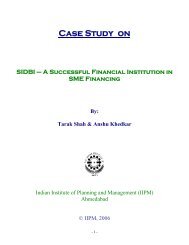
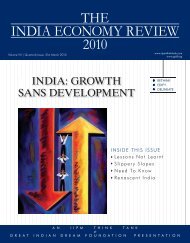
![[Feb 2008, Volume V Annual Issue] Pdf File size - The IIPM Think Tank](https://img.yumpu.com/43961117/1/190x245/feb-2008-volume-v-annual-issue-pdf-file-size-the-iipm-think-tank.jpg?quality=85)
![[June 2008, Volume V Quarterly Issue] Pdf File size - The IIPM Think ...](https://img.yumpu.com/41693247/1/190x245/june-2008-volume-v-quarterly-issue-pdf-file-size-the-iipm-think-.jpg?quality=85)

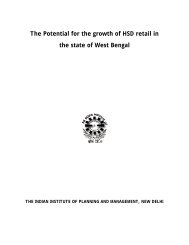
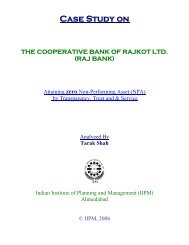
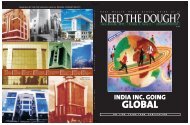
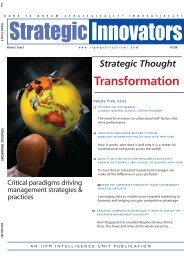
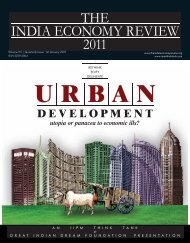
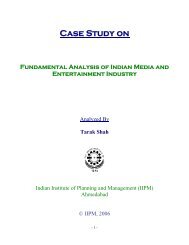
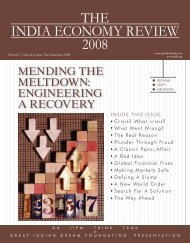
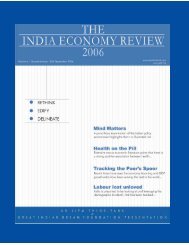
![[Volume VI | Quarterly Issue: 31st May 2009] Pdf File size](https://img.yumpu.com/27796051/1/190x245/volume-vi-quarterly-issue-31st-may-2009-pdf-file-size.jpg?quality=85)